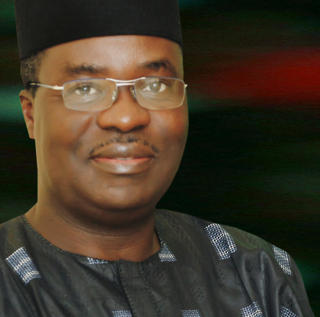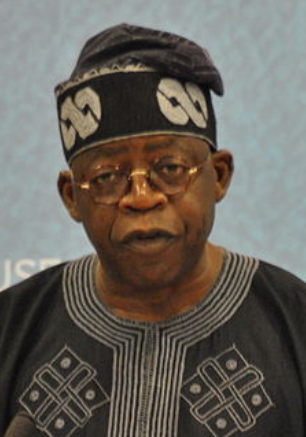Related Research Articles

The Peoples Democratic Party is one of the three major contemporary political parties in Nigeria, along with its main rivals, the All Progressives Congress and the Labour Party.

The president of the Federal Republic of Nigeria is the head of state and head of government of the Federal Republic of Nigeria. The president directs the executive branch of the federal government and is the commander-in-chief of the Nigerian Armed Forces.

The Odi massacre was an attack carried out on November 20, 1999 by the Nigerian Armed Forces against the predominantly Ijaw town of Odi in Bayelsa State. The attack came in the context of an ongoing conflict in the Niger Delta over indigenous rights to oil resources and environmental protection. It is estimated that over 900 civilians were killed in the attack.

Chief Bola Ahmed Adekunle Tinubu is a Nigerian accountant and politician who is the president-elect of Nigeria. He served as governor of Lagos State from 1999 to 2007 and senator for Lagos West during the brief Third Republic.

Umaru Musa Yar'Adua was a Nigerian politician who was the President of Nigeria from 2007 to 2010. He was declared the winner of the Nigerian presidential election held on 21 April 2007, and was sworn in on 29 May 2007.

Goodluck Ebele Azikiwe Jonathan is a Nigerian politician who served as the president of Nigeria from 2010 to 2015. He lost the 2015 presidential election to former military head of state General Muhammadu Buhari, and was the first incumbent president in Nigerian history to concede defeat in an election. Prior to that, he served as the vice president of Nigeria from 2007 to 2010 under the administration of Umaru Musa Yar'Adua; and in oil-rich Bayelsa State as governor from 2005 to 2007, and deputy governor from 1999 to 2005.
Babagana Kingibe OV GCON is a Nigerian diplomat, politician and civil servant who has held several high ranking government offices, culminating in his appointment as the Secretary to the Government of the Federation from 2007 to 2008. He spent over a decade in the Foreign Service cadre and has been in politics since the 1970s serving six heads of state; most recently as a member of the inner circle of President Muhammadu Buhari.

Atiku Abubakar is a Nigerian politician and businessman who served as the vice president of Nigeria from 1999 to 2007 during the presidency of Olusegun Obasanjo. He ran as governor of Adamawa State in 1990, 1996, and in 1998, when he was finally elected before he became Obasanjo's running mate during the 1999 presidential election and was re-elected in 2003.

Peter Gregory Obi is a Nigerian businessman and politician who served as governor of Anambra from March to November 2006, February to May 2007, and June 2007 to March 2014. In May 2022, he became the Labour Party candidate for President of Nigeria in the 2023 presidential election, after defecting from the Peoples Democratic Party.

Mohammed Rabi'u Musa Kwankwaso, FNSE FNIQS is a Nigerian politician who was the Governor of Kano state from 1999 to 2003 and 2011 to 2015. After he lost his re-election in 2003, he was appointed the first Minister of Defence of the Fourth Republic with no prior military background from 2003 to 2007, under the administration of former president Olusegun Obasanjo. He was later elected to the Senate in 2015, serving one term under the platform of the All Progressives Congress (APC) representing Kano Central Senatorial District.
Sule Lamido was born on served as Foreign Affairs Minister of Nigeria from 1999 to 2003. He was elected governor of Jigawa State in April 2007. He is a member of the former ruling People's Democratic Party (PDP). He ran successfully for reelection on 26 April 2011. In 2015 he and his sons were put on trial for embezzling state fund by the EFCC.

General elections were held in Nigeria on 21 April 2007 to elect the President and National Assembly. Governorship and State Assembly elections had been held on 14 April.

Corruption is an anti-social attitude awarding improper privileges contrary to legal and moral norms and impairs the authorities' capacity to secure the welfare of all citizens. Corruption in Nigeria is a constant phenomenon. In 2012, Nigeria was estimated to have lost over $400 billion to corruption since its independence.

The Independent National Electoral Commission (INEC) is the electoral body which oversees elections in Nigeria. It was established in 1998 shortly before Nigeria's transition from military to civilian rule.

Chief (Dr.) Solomon Daushep Lar was a Nigerian politician who has held various offices at the National level for over 50 years. He was a member of the first national parliament when Nigeria gained independence in 1960. He was elected governor of Plateau State on the Nigerian People's Party (NPP) platform during the Nigerian Second Republic, holding office from October 1979 until the Military coup of 31 December 1983 that brought General Muhammadu Buhari to power. Later, he was founding chairman of the People's Democratic Party (PDP).
Hameed Ibrahim Ali is the current Comptroller General of the Nigerian Customs Service. A retired military officer, he previously served as Military Governor of Kaduna State from 1996 to 1998. After retirement, he became Secretary of the Arewa Consultative Forum a political and cultural association of leaders in Northern Nigeria.
Adedoyin Ajibike Okupe, better known as Dr. Doyin Okupe, is a Nigerian physician and politician who co-founded Royal Cross Medical Centre and was the National Publicity Secretary of National Republican Convention (NRC). He was once detained under General Sani Abacha, and subsequently disqualified from participating in United Nigeria Congress Party (UNCP) primaries; later on, he was a governorship aspirant of the People's Democratic Party (PDP) in Ogun State.

Bashir Yusuf Ibrahim is a Nigerian politician and businessman. He was the National Chairman of Peoples Democratic Movement (PDM), a Nigerian political party.
Mallam Garba Shehu born on is a Nigerian Journalist and politician who serves as the Senior Special Assistant, Media and Publicity to the President of the Federal Republic of Nigeria, Muhammadu Buhari. He was the president of Nigerian Guild of Editors and spokesperson of the former vice president of Nigeria, Atiku Abubakar.

The 2023 Nigerian presidential election was held on 25 February 2023 to elect the president and vice president of Nigeria. Bola Tinubu, a former Governor of Lagos State and nominee of the All Progressives Congress, won the disputed election with 36.61% of the vote, 8,794,726 total votes. Runners-up were former Vice President Atiku Abubakar, Peoples Democratic Party, and former Governor of Anambra State Peter Obi, Labour Party, who both immediately contested the result; Obi claimed he won. Other federal elections, including elections to the House of Representatives and the Senate, held on the same date while state elections were scheduled to hold two weeks afterward on 11 March, but were postponed by a week and will be held on 18 March. The inauguration is set for 29 May 2023.
References
- ↑ "My Watch – A Memoir by Olusegun Obasanjo (3 Vols)". www.sunshinenigeria.com. Retrieved 2022-10-27.
- ↑ "Book review | Ex-Nigerian leader's latest book is titled, 'My Watch'". Nation. 2020-07-02. Retrieved 2022-10-27.
- ↑ Administrator (2016-02-03). "'My Watch' and other OBJ's tales". Blueprint Newspapers. Retrieved 2022-10-27.
- ↑ Muomah, Onyinye (2014-12-15). "I didn't know about Stella's tummy tuck that turned tragic – Obasanjo". Premium Times Nigeria. Retrieved 2022-10-27.
- ↑ Times, Premium (2014-12-12). "Obasanjo's Autobiography: Group condemns court order". Premium Times Nigeria. Retrieved 2022-10-27.
- ↑ Ezeamalu, Ben (2014-12-11). "Atiku is a 'shameless liar,' Obasanjo says in new book". Premium Times Nigeria. Retrieved 2022-10-27.
- ↑ "Hypocrisy Of Obasanjo's Book Of Vengeance - P.M. News" . Retrieved 2022-10-27.